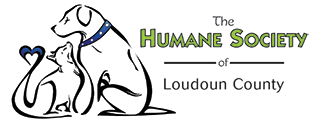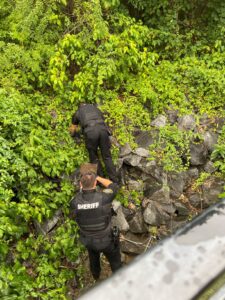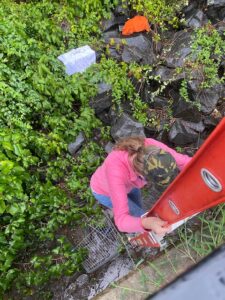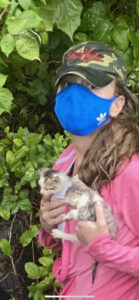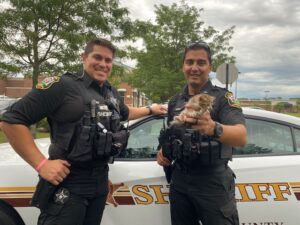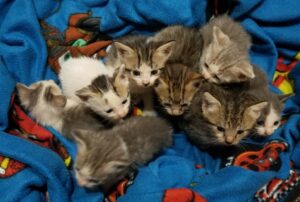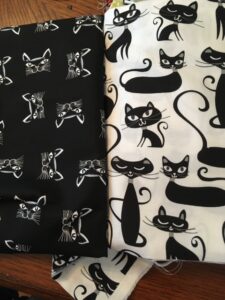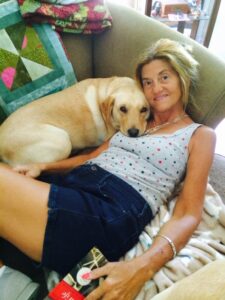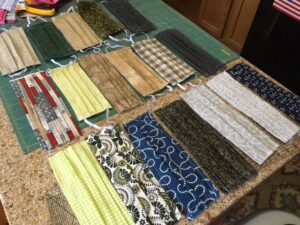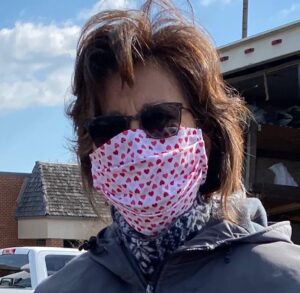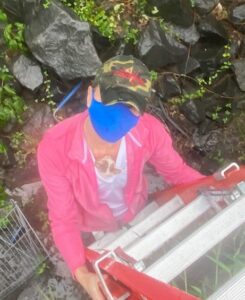
By Sharon Nylec
Our story begins as they all do. Jenn Reed, TNR/feral kitten specialist and long-time volunteer for the Humane Society of Loudoun County, got a call about some kittens in a ravine behind a Harris Teeter shopping center. When Jenn arrived to assess the situation, it was a lot more difficult than she thought it would be. The kittens were located in a very precariously located pile of rocks which was 10 or 12 ft below street level. Next to the rocks was a stream that was definitely built to catch storm water runoff, and the forecast said we were going to get some big storms for the next couple of days.
The kittens were in a dangerous spot. There really was no other way to get to them without a ladder. So Jenn called her step dad, Mike, and he rushed right over with an extension ladder. He held it while Jenn climbed down into “Kitten Canyon”.
Now, this scene apparently looked suspicious to the good shoppers of Harris Teeter. I mean, no good can come from masked people who show up with tuna and traps. They weren’t sure what law we were breaking, but Jenn and I were looking (and smelling, thanks to the tuna) a little fishy so they decided they better call Loudoun’s finest to assess the situation. Pretty soon, two cars from the Loudoun County Sheriff’s Office (LCSO) rolled up. As soon as Jenn explained there were helpless kittens in a ravine and that a big storm was coming, Deputy Torres and Deputy First Class Chenari were ready to shift into rescue mode.
A gentle rain began to fall, a harbinger of the deluge to come. With all eyes on the gloomy sky, Jenn and the deputies got to work with carriers, flashlights, and bite gloves. Meanwhile, I stood with them in the rain playing a video of a mama cat over and over hoping the sound would calm the kittens and lure them out of hiding. Not long after we put our minds to it, we liberated the first baby kitten from the cave underneath the rock pile. That moment was like uncorking a bottle of kitten champagne, because in the next hour–in lightning, thunder, and steady rain– seven more kittens came trundling out of the rock hole/cave to see where their brothers and sisters had gone.
Duty called and the deputies had other matters to attend to. So they didn’t get to see what happened after they pulled the first baby out from under the rocks. But that’s exactly what started the ball rolling. Plus, there was this dedicated HSLC volunteer with bull dog tenacity, and unparalleled rock-scrambling ability: Thanks Jenn for sticking it out in cruddy weather and for saving 8 more little lives!
In closing, it is a FACT that kittens born outdoors are never anywhere convenient. So, that is why you may find HSLC volunteers lurking in back allies, ravines, dark spooky woods or next to garbage dumpsters on a Saturday night. It’s okay, you can call the cops on us, we like recruiting new friends and volunteers. Speaking of which, thanks again to Deputies Torres and Chenari for uncorking the kitten genie bottle!
- C’mon out little buddies!
- Jenn descending into Kitten Canyon
- Last two and now the kitten genie bottle is corked!
- Good job, Deputies!
- 8 little lives saved!
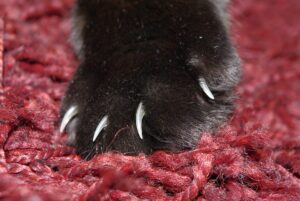
UPDATE: As of July 1, 2024, both Virginia and Maryland have outlawed declawing in most cases.
Scratching and clawing behavior is one of the reasons cats are often rehomed or not adopted. While declawing can seem like a viable solution, this controversial procedure actually creates more problems than it solves.
Why do cats scratch/claw?
- To “sharpen” their nails. Like any other animal, cats’ nails are constantly growing. This means that the outer husk of their nail dies off as the new nail emerges underneath. Often, cats scratch things in order to shed this husk. Not only does scratching “sharpen” the nail, it makes the cat feel better.
- To stretch their muscles. If you have ever witnessed a cat scratching or clawing something, you can attest to the fact that they often stretch out their front legs as far as they can go. Like the downward dog pose in yoga, this opens their body up and feels good.
- To mark their territory. When a cat scratches something, it leaves its scent behind on that object. Other cats can smell this and are warned of their trespassing. This is often comforting to the scratcher, especially the insecure ones, and makes them feel more at home.
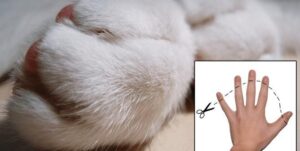
If performed on a human being, declawing would be like cutting off each finger at the last knuckle.
What is declawing?
- The declawing procedure is referred to as an onychectomy. Per Merriam-Webster, this procedure is the “surgical removal of a toenail or fingernail”. However, the surgery itself involves using either a sterile nail trimmer, surgical blade, or laser to literally cut through the bone of the third digit of the toe, which is the bone from which the claw grows.
Why is the procedure so harmful?
- It is very painful. Imagine getting the last digit of your toes or fingers cut off. It would be difficult for you to walk or use your hands and feet for a while after the procedure.
- It can cause complications, diminishing the cat’s quality of life. A cat without claws is unable to defend itself and may become a biter because they no longer have their claws for defense.
- In addition, even when the procedure is done with great precision, it can leave the cat with an altered way of walking which can lead to the development of arthritis.
- For several days after surgery, shredded newspaper is typically used in the litter box to prevent litter from irritating declawed feet. This unfamiliar litter substitute, accompanied by pain when scratching in the box, may lead cats to stop using the litter box.
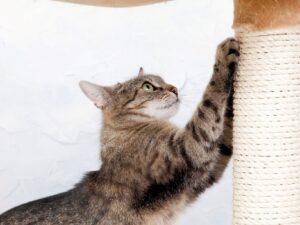
Train your cat to use a scratching post by sprinkling it with cat nip.
What are the alternatives?
- If adopting a young cat or kitten and a scratching problem is noticed, it is important for the owner to train their cat where it is appropriate to scratch, and where it is not. Scratching posts, boards, and furniture are available for sale almost anywhere pet products are sold. Because clawing and scratching is a natural behavior, kittens and young cats that have access to the appropriate scratching tools will use them.
- There are some cats that will just scratch whatever they see first, whether it be a scratching post or your grandmother’s antique chair. There are products that are meant to deter or attract cats from scratching. For example, something as simple as sprinkling cat nip on the scratching post can entice the cat enough for them to scratch there. There is also tape that can be applied to vertical surfaces of furniture. This tape is meant to be safe on furniture but uncomfortable for the cat when they attempt to scratch.
- Nail Caps. Talk to your veterinarian or local pet store employee about nail caps. These are made to fit over your cat’s nails and stay on with glue. Often made of soft plastic, the cat cannot do as much, if any, damage when scratching with them on.
- Frequent Nail Trims. As stated before, cats’ nails are constantly growing. By trimming them every week or two, the cat will not feel the need to scratch as much.
Declawing is illegal in over 40 countries and counting. Several cities in the U.S. have banned declawing. And, last year, New York became the first state to ban the procedure except in rare cases when it is medically necessary. The American Medical Veterinary Association (AMVA) “discourages the declawing (onychectomy) of cats as an elective procedure and supports non-surgical alternatives to the procedure.” HSLC does not condone declawing and will refuse an adoption if the candidate plans to declaw.
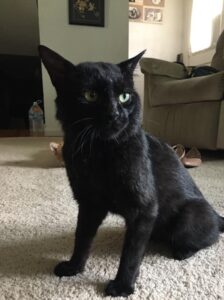
Tonight Mochi – now known as Hubble, went to his furever home. As always, it was a bittersweet “goodbye”. This time was a new experience for me as a foster mom as I am also a stepmom in training.
I admit, I do shed tears for each cat who has been adopted in my care–but this time was different.
We didn’t have Mochi long but our Ella (8 years old) bonded quickly to him. He was super friendly and was her little buddy. She’s been a great helper, seems to truly love cats and takes a real interest in animals.
Tonight as the forever family met with Mochi, Ella had a hard time. Normally I’m the one who has the hard time. But as the family started to leave, Ella broke down and cried in my arms. It was heartbreaking to say the least. Yet somewhere in between our tears, I felt there was something positive that could come from this moment.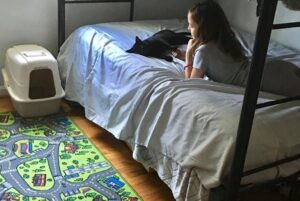
I have been teaching the kids what it means to foster and why I choose to do what we do. Most importantly, I stress that I am not “giving a cat away” as it may seem to young eyes. I want them to understand that we are saving them–that this is for the greater good. I hope she understands (I think she does) and I hope this teaches the kids what it means to love and care for animals on a deeper level. It is important to fully respect and protect them and see them as a life worth living and not ever as an accessory.
We talked about it and I think she feels the same way I do. There is sadness, of course, of missing them and wondering “Will he be okay?…will he be loved?…can they love him like I do?” In the end, I think it was actually good for Ella to know she can care for something and really love another.
So tonight we all cried a little, both sad and happy tears as it turns out. We love you Mochi and all the joy you will bring to your new family, their son and those who are lucky enough to meet you!
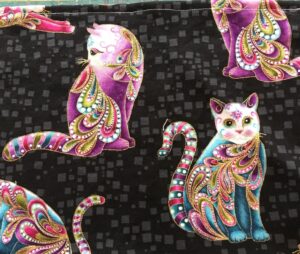
When the Humane Society of Loudoun County (HSLC) received a generous check with a note indicating that the donation came from selling masks, we were intrigued. So, one of our volunteers reached out to the donor, Cyndi, to learn more.
Cyndi had teamed up with her friend and neighbor, Cathy, to hatch the mask-making enterprise. Cathy custom makes each mask while Cyndi markets them. Masks sell for a very affordable $7 for adults and $6 for kids, with $1 donated to HSLC for each mask purchased. So far, the dynamic duo has sold hundreds of masks and will keep the operation going as long as there’s demand.
The partnership has been very rewarding for Cyndi and Cathy, and win-win for the community. As Cyndi told us, “It’s been a fun endeavor helping people to stay healthy while also helping the animals get the medical care and forever homes they desperately need.”
If you are interested in purchasing masks, be sure to check out the photo gallery below to see the wide variety of available patterns–including cats and dogs! Masks are made from 100% pre-washed cotton. Please email Cyndi to select your pattern at Masksbycathyandcyndi@yahoo.com and Cathy will custom make your mask(s) for you. Limit is 30 masks per person. Payment is via check or Venmo.
Thank you, Cyndi and Cathy for making a difference in the community during these challenging times!
The gallery also includes Cyndi’s dogs, Ace and Frodo, the “loves of our lives, especially now”. Cathy is pictured with one of her five fur babies. Her dogs are Casey, Carley and Cookie and the cats are Cairo and Cooper.
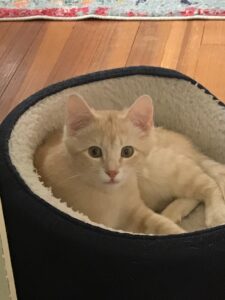
June is Adopt-a-Cat-Month®. Started by the American Humane Association in 1974, the month marks an opportunity for animal shelters and rescue organizations like the Humane Society of Loudoun County (HSLC) to encourage the public to adopt rather than shop for feline companionship. Here are two recent stories that show how wonderful adopting can be.
![]()
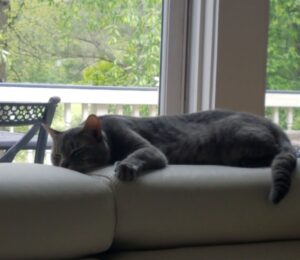
Felix is living his best kitty life.
Melissa and Jeff found their new best friend after he was rescued along with 35 other cats from a home eviction in Stephens City (read the full rescue story here). The pair have adopted several cats over the years. They usually adopt older animals that need extra love but made an exception with Felix (originally named Foxy). The couple immediately fell in love with his playful and boisterous personality. Felix is just over a year old and loves to relax and spend time cuddled up on the couch. He has brought so much joy to this forever family.
Another one of our new parents, Jacqueline, adopted three kittens after the passing of her Weimaraner at the age of 15. Jacqueline stated that she knew it was time to open her home to more rescues, particularly cats. After she and her family reviewed pictures of a new litter with three kittens –Peaches, Archie, and Toby– they felt an instant connection. Thankfully, not wanting to separate the siblings, Jacqueline and her family adopted all three!
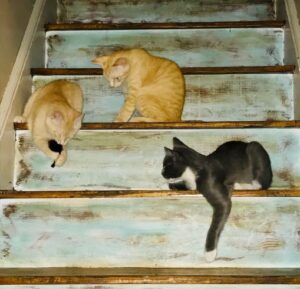
Peaches, Archie, and Toby playing on the stairs.
After two weeks in their new home, the kittens have all developed unique personalities: Archie the “snuggler”, Toby the “couch potato,” and Peaches the “regal queen.” Jacqueline highlighted how much joy the kittens have brought to the household, racing up the stairs and sitting in the windowsills to watch the passerby. She loves that the kittens bring such a unique energy to her home.
During the COVID-19 pandemic, HSLC has taken extra measures to ensure that potential adopters feel comfortable meeting our cats. Melissa and Jeff shared that they felt very safe throughout the adoption process and were excited to be able to meet Felix in person before adopting. Likewise, Jacqueline found the process to be safe and seamless, noting “It’s clear that HSLC really cares about the animals they are placing.”
If you are interested in adopting a cat through HSLC, please visit our website to view the available animals and complete an application.
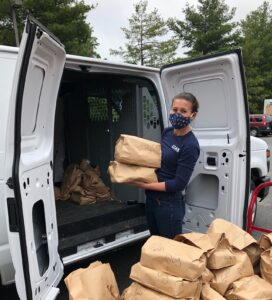
Dear Pet Pantry Staff,Thank you so much! I got laid off from my job. You are helping me to take care of my two cats and dog during these challenging times. Thank GOD for your generosity.Forever Thankful, Michelle
We all love our furry friends to pieces. So, imagine how difficult it would be to surrender the family cat or dog because you suddenly found yourself unemployed. Because of the pandemic, this is exactly what some families in our community are now facing. Thankfully, the Loudoun Pet Pantry (LPP) is giving these pet owners a leg up during these uncertain times.
In 2013, the Humane Society of Loudoun County (HSLC), partnered with Loudoun County Animal Services (LCAS) and Loudoun Hunger Relief (LHR) to create the Loudoun Pet Pantry. LPP provides families in need with kits of donated pet food. Over the last seven years, HSLC and LCAS have supplied the pantry with over 18,000 cat and dog food kits, allowing pets to remain in their loving homes.
Due to COVID-19, the Loudoun Pet Pantry has adapted its operation to ensure the safety of everyone involved and to meet a 30% increase in demand for its services. We are extremely grateful for the wonderful outpouring of community support that has helped meet this demand.
Following physical distancing guidelines, hard-working volunteers from the Humane Society of Loudoun County continue to collect, sort and transport food to the pantry. The shelter is closed to volunteers right now so only staff members are running the pantry itself. Talia Czapski, the LCAS Community Manager, notes that it has been difficult “Ramping up kit production and figuring how to make things work without our amazing volunteers! We certainly miss their help!”
HSLC President, Juanita Eaton is very proud of the program and its ability to further the organization’s goals. “Pet retention is an important part of our mission as our programs are based on the ‘No Kill Equation’. We don’t want a family to have to surrender their pet to a shelter or rescue simply because they can’t afford pet food.”
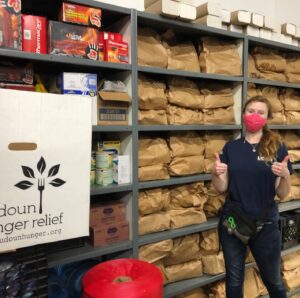
LCAS staff member giving two thumbs up to stocked pantry shelves.
This incredible program has helped countless families in Loudoun County over the years. But, it can’t continue to provide and expand its services without ongoing backing from the community. There are many ways to support the Loudoun Pet Pantry:
- Drop off canned and dry cat and dog food in donation boxes located across the county. Find a donation box closest to you.
- Donate food through HSLC’s Amazon Charity List or email an amazon.com gift card to helpanimals@humaneloudoun.org
- Host a pet food drive. Ideas to get you started can be found on our website.
- Lastly, HSLC is looking for a community partner to physically house HSLC’s contribution to the Loudoun Pet Pantry. Please contact us at helpanimals@humaneloudoun.org if you have climate controlled storage space to donate.
Thank you!
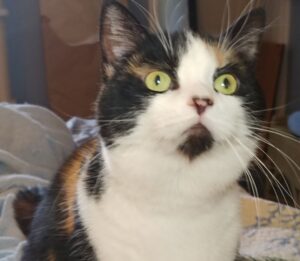
The new year was looking up for Calico Charlie. She came to The Humane Society of Loudoun County (HSLC) in January after she was discovered near a hospital in West Virginia. She quickly received an adoption application along with another HSLC cat because, well, who could resist this multicolored beauty!
Sadly, after a routine pre-adoption blood test (commonly referred to as a “combo test”), Charlie tested positive for the Feline Leukemia Virus (FeLV) which brought her adoption process to a screeching halt.
FeLV is a viral infection in cats that affects their immune system and bone marrow. The virus is typically spread from cat to cat via saliva. It can also be spread by grooming, shared food bowls, and bite wounds. A mother cat can also transmit the virus to a kitten in utero or during nursing.
Charlie’s initial combo test told us that she was exposed and that the virus was circulating in her blood, but it did not mean that she was permanently infected. It is possible, especially for adult cats, to fight off the infection. To find out if it is a persistent infection the vet will run an IFA test. If this test is positive, the cat is positive for FeLV and always will be.
Cats that are infected as kittens do not have a very long life expectancy—85% do not live past the age of three. Cats infected as adults, like Calico Charlie, can live a relatively normal life indoors with proper vet care and a high-quality diet.
There is an FeLV vaccine that is fairly effective, but not 100%. If positive cats and negative cats live in the same house, it is recommended that they be kept in separate rooms to avoid transmission, even if the negative cats are vaccinated. The virus does not live long outside the body (only a few hours) making human to cat transmission less likely via hands or clothing. Because of her positive IFA test, Charlie went to a foster home to live with Wally Walrus, another FeLV positive cat rescued by HSLC.
Thankfully, it didn’t take long for Charlie her to find her purrfect forever “only cat” home with the most amazing family! After learning more about FeLV and how to care for these cats they welcomed her with open arms. Best of luck to Calico Charlie and her new family!
If you are interested in adopting a special needs cat such as Calico Charlie please contact HSLC at helpanimals@humaneloudoun.org.
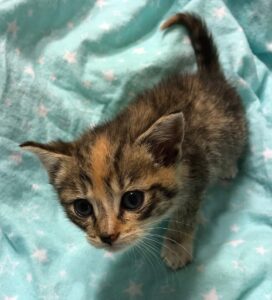
On April 28, a team of volunteers from the Humane Society of Loudoun County (HSLC) mobilized to help save a desperate family of five kittens and their mother from underneath a residential deck. Because of the cold weather, it was imperative that the kittens were rescued as quickly as possible. It took no more than a post in the volunteer Facebook group to rally the team needed for the mission.
In a heartwarming act of heroism, the volunteers were able to rescue the family in 24 hours. An experienced foster family took in the kittens and is in the process of helping them recover. The quintet of kittens were aptly named after the Golden Girls and Dorothy’s ex-husband, Stan. No doubt, they will bring just as much joy to the world as the original characters did on the small screen. The feral mother cat was spayed and vaccinated before safely being returned to her outdoor home.
The volunteers weren’t done yet, though. Another friendly cat was also found on the property, badly injured. She was rescued and taken to the vet to treat her wounds. Once recovered, she will be put up for adoption.
Amidst all the uncertainty in the world right now, one thing is clear. These volunteers quickly, selflessly, and heroically helped seven cats, and now six of them have the opportunity to find their forever homes. According to Donna Drake, HSLC Vice President, “We cannot save these animals without our amazing group of volunteers and rescue partners. They are the reason we can save and help so many animals and give them a better life.”
Thank you to the HSLC volunteers Pam Harvey, Heidi Wallner, Molly Boyne, Aseel Alsabawi, Amy Richards, Dora Lea Spring, and Jennifer Reed. Thank you also to Tina Creller of Mountain Cats TNR and Felicia McDonald of The Cats Voice.
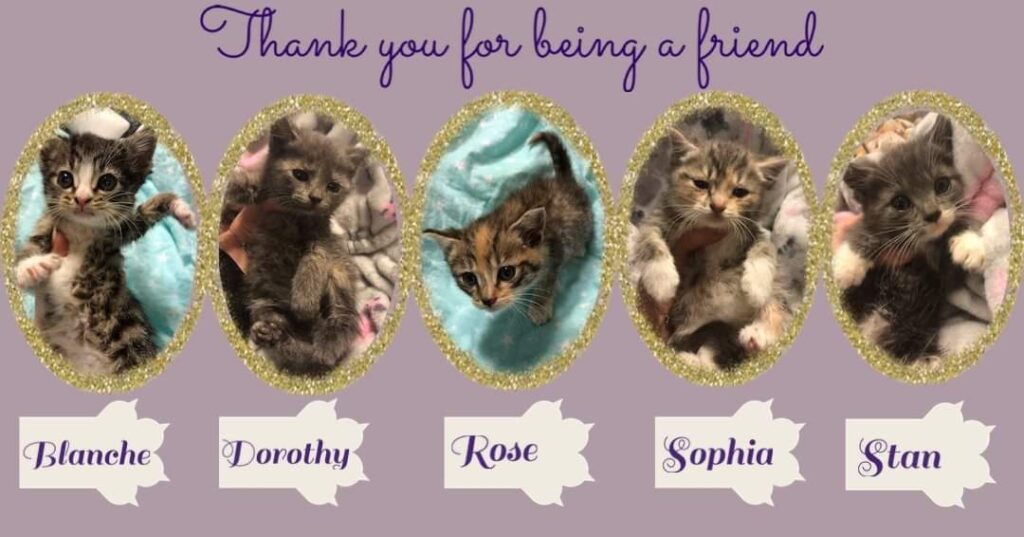
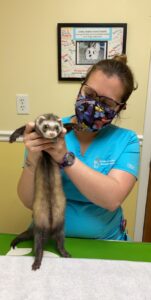
By Heather Nokes
What day is it? Those of us who have been at home for weeks on end are having trouble keeping track. But you know what we are doing? Spending more time with our pets! This means paying more attention to them, their behaviors, and their health. Luckily, veterinary clinics and hospitals are deemed essential businesses. As a seasoned veterinary assistant, this author (see photo) and her colleagues want pet owners to know a few things in this uncertain time.
Our hospitals are just as busy, if not more so, than usual: With people having more free time on their hands, they are able to bring their pet in for routine visits. This is fantastic! However, some veterinary clinics and hospitals are reducing their business hours to protect their staff from exposure. And those hospitals that are running at a normal capacity are filling appointments quickly. It is also important to keep in mind that most of us are doing telemedicine and curbside service which often take up more time than normal office procedures.
We WANT to see your pet… if they are sick: Because of the above listed adjustments, your veterinary hospital may be prioritizing sick visits. This means routine vaccinations and preventative care exams are being put off for weeks or even months.
We act different when you are not around: When we take your pet from you, we understand that it can be nerve-wracking for both you and your fur baby. We take this into account and tend to baby your pet more than you would expect behind closed doors. Not many jobs allow you to use baby talk and cuddles but your veterinary staff is well versed. We do this because we genuinely care for animals and always treat our patients like our very own pets.
At this point, there is no evidence that animals play a significant role in spreading the virus that causes COVID-19: According to the CDC, the risk of animals spreading COVID-19 to people is considered to be low. CDC is working with human and animal health partners to monitor this situation and will continue to provide updates as information becomes available.
Of course, if you have concerns or questions about your pets in this uncertain time, your veterinary hospitals are more than happy to speak with you over the phone. And as always, in an emergency, take your pet to the nearest emergency clinic ASAP!
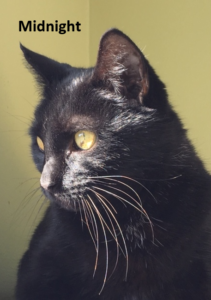
By Maureen Preville
That little black dress and debonair tux are staples in our closets for those occasions when we want to turn heads. Not so, though, for chic, sleek, black-attired cats relegated to wallflower status, being frequently overlooked by potential suitors without even a glance. The problem is so common that it has earned its own name – black cat syndrome. Sadly, black cats (and dogs) fall victim to this phenomenon and are passed over in favor of more colorful pets.
Despite being lauded as calm, affectionate, intuitive, playful and grateful for love, black cats are usually the last to be adopted from shelters and rescue organizations, if indeed they are adopted at all. Blame it on centuries-old prejudices against black cats, and more recently, the proliferation of ‘selfie’ photos which some feel don’t properly capture a black cat’s lovely features.
 Although black cats were unjustly trashed in the superstitious Middle Ages as witches’ companions, the good far outweighs the bad in folklore. In Scottish and Celtic lore, a black cat signifies good luck and prosperity, and a woman with a black cat is promised to have many suitors. In ancient Egypt, no animal was held in as high esteem as the black cat. The Egyptian goddess Bastet, who was commonly depicted as a black cat, personified the playfulness, grace, affection and cunning of a cat and the power of a lioness. During the height of her popularity, killing a black cat was punishable by death. Lastly, what other pet has been more commanding in world history than black cats? A good example is Felix the cat, who was among the first large balloons in the 1920s Thanksgiving Day Macy’s Parades.
Although black cats were unjustly trashed in the superstitious Middle Ages as witches’ companions, the good far outweighs the bad in folklore. In Scottish and Celtic lore, a black cat signifies good luck and prosperity, and a woman with a black cat is promised to have many suitors. In ancient Egypt, no animal was held in as high esteem as the black cat. The Egyptian goddess Bastet, who was commonly depicted as a black cat, personified the playfulness, grace, affection and cunning of a cat and the power of a lioness. During the height of her popularity, killing a black cat was punishable by death. Lastly, what other pet has been more commanding in world history than black cats? A good example is Felix the cat, who was among the first large balloons in the 1920s Thanksgiving Day Macy’s Parades.
Now in modern days, the US Centers for Disease Control asserts that cats of all colors and varieties provide emotional support, improve moods and contribute to the overall morale of their owners. Owning one may decrease blood pressure, cholesterol and triglyceride levels, as well as eliminate loneliness.
As the owner of three wonderful black cats within my life, I can personally testify that they are sweethearts. We encourage you to find out for yourself. Check out the dynamite kitties that can do wonders for you: https://humaneloudoun.org/adopt/available-cats/
